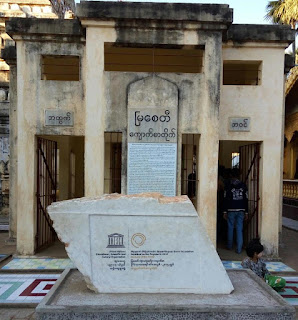English for Hotel and Catering Industry (Unit 23 Offering Help and Advice)
- Posted by zar ni (My Way!) on February 25, 2013 at 10:48
- Offering help and advice (အကူအညီႏွင့္အႀကံဥာဏ္ေပးျခင္း)
ဟိုတယ္ေတြကိုၿမိဳ႕အငယ္စားေလးလို႔တင္စားၾကတယ္။
ဘာျဖစ္လို႔လဲဆိုေတာ့ ၿမိဳ႕တစ္ၿမိဳ႕မွာ ေနထိုင္သူလူထုအတြက္လိုအပ္တဲ့၀န္ေဆာင္မႈေတြကိုပံ့ပိုးေပးတဲ့ဌာနေတြရွိသလိုမ်ိဳးပဲ
ဟိုတယ္ေတြမွာလည္းလာေရာက္တည္းခိုသူေတြအတြက္ အစစအရာရာ၀န္ေဆာင္မႈေပးႏိုင္ေအာင္
က်ိဳးစားၾကရလို႔ပါပဲ။ ဟိုတယ္မွာလာေရာက္တည္းခိုရင္း မေတာ္တဆထိခိုက္ဒဏ္ရာရမႈေတြ၊
ဖ်ားနာမႈ ေတြရွိလာရင္ ဘယ္လိုေျပာဆိုသလဲဆိုဒါဒီသင္ခန္းစာမွာေလ့လာၾကည့္ပါမယ္။
Emergency first aid is needed
Jack: Anna, one of the guests has just fallen over and cut his
head badly. It's Mr. Schmidt in room 397.
Anna: I'll get the first aid equipment and come straight up.
Don't move him. We should call an ambulance.
Jack: Yes, I've just called one.
Anna: Here Mr. Schmidt, you shouldn't move. Drink some water. I
think you fainted in the heat. It's very hot today. Have you eaten anything
today?
Mr. Schmidt: No, no, I haven't had lunch yet. I didn't feel well this
morning.
Anna: How are you feeling now? Are you in pain?
Mr. Schmidt: Umm, I feel better now. But, my head . . .
Anna: You should see a doctor. So we've call an ambulance.
They'll be here soon.
Mr. Schmidt: Oh, yes, thank you.
Anna: You've cut your head, so I'll put a plaster on it to stop
the bleeding.
ေလ့လာထားရမည့္ expression မ်ား
One of the guests has just fallen
over. ဧည့္သည္တစ္ေယာက္လဲက်သြားလို႔။/မူးလဲသြားလို႔။
We should call an ambulance.
လူနာတင္ယာဥ္ေခၚရင္ေကာင္းမယ္။
Don't move him. သူ႔ကိုမလႈပ္ေစနဲ႔။
ေနရာမေရႊ႕နဲ႔။
Are you in pain? နာေနလား။
How are you feeling now?
အခုဘယ္လိုေနေသးလဲ။ ဘယ္လိုခံစားေနရလဲ။
You should see a doctor.
ဆရာ၀န္နဲ႔ျပသင့္တယ္။
ေလ့လာထားရမည့္ေ၀ါဟာရမ်ား
accident
မေတာ္တဆထိခိုက္ဒဏ္ရာရမႈ။
bleeding ေသြးထြက္ျခင္း။
burn (v) မီးပူေလာင္သည္။
cut (n) ဓားရွသည္။ ျပတ္ရွဒဏ္ရာ။
dentist သြားဆရာ၀န္။
emergency အေရးေပၚအေျခအေန။
faint မူးေမ့လဲက်သည္။ သတိလစ္သည္။
hospital ေဆး႐ံု။
leg ေျခေထာက္။
on call (doctor) တာ၀န္က်ဆရာ၀န္။
pharmacy ေဆးဆိုင္။
plaster ပလာစတာ။ ေက်ာက္ပတ္တီး
hurt (v) နာက်င္သည္။ ထိခိုက္မိသည္။
sick ဖ်ားနာသည္။
report သတင္းပို႔သည္။ တင္ျပသည္။
toothache သြားနာသည္။
ေလ့လာထားရမည့္၀ါက်တည္ေဆာက္ပံုမ်ား
Present Perfect
The Present Perfect (have + past
participle of the verb) ကို မၿပီးျပတ္ေသးတဲ့လုပ္ငန္းေတြ၊ ဒါမွမဟုတ္
မၾကာေသးခင္ကလုပ္ၿပီးသြားတာေတြကိုေျပာခ်င္တဲ့အခါမွာသံုးပါတယ္။ just, yet
စတာေတြနဲ႔တြဲသံုးတာကိုေလ့လာၾကည့္ပါ။

လက္ရွိအခ်ိန္ရဲ႕ေရွ႕မွာျဖစ္ပ်က္ခဲ့တာေတြကိုရည္ညႊန္းပါတယ္။
ဒါေပမယ့္ past tense မွာလို အခ်ိန္အတိအက်သိစရာမလိုပါ။ present perfect tense
ဟာစာသင္သားတို႔အတြက္ အင္မတန္ မ်က္ေစ့လည္စရာ ေကာင္းပါတယ္။
သူ႔ကိုေအာက္ပါအေၾကာင္းအရာေတြနဲ႔တြဲေလ့လာ တာေကာင္းပါတယ္။
(၁) Experience
အေတြ႕အႀကံဳကိုေျပာတဲ့အခါ
I have been to France.
ျပင္သစ္ကိုေရာက္ဖူးတယ္။
I have seen that movie before.
ဒီ႐ုပ္ရွင္ကိုအရင္ကၾကည့္ဖူးတယ္။ ၾကည့္ၿပီးသား။
(၂) Changes over time အခ်ိန္နဲ႔အမွ်ေျပာင္းလဲသြားမႈကိုေျပာတဲ့အခါ
You have grown since the last
time I saw you. ေနာက္ဆံုးေတြ႕ခဲ့တာထက္ထြားလာတယ္။
My English has really improved
since I moved to Australia.
ေၾသာ္စထေရးလ် ကိုေျပာင္းလာကတဲက
အဂၤလိပ္စာတကယ္တိုးတက္လာခဲ့တယ္။
(၃) Accomplishments
ၿပီးေျမာက္ေအာင္ျမင္မႈကိုေျပာတဲ့အခါ
Man has walked on the Moon.
လကမၻာေပၚလူသားတို႔ေျခခ်ႏိုင္ခဲ့ၿပီ။
Our son has learned how to
read. ကၽြန္ေတာ္တို႔သားေလးစာဖတ္တတ္ခဲ့ၿပီ။
(၄) An Uncompleted Action You Are
Expecting ျဖစ္လာမယ္လို႔ေမွ်ာ္လင့္ထားတဲ့မၿပီးျပတ္ေသးေသာကိစၥမ်ားကိုေျပာတဲ့အခါ
James has not finished his
homework yet. ဂ်ိမ္းစ္ဟာ သူ႔အိမ္စာေတြမၿပီးေသးဘူး။
Bill has still not arrived.
ဘီလ္ေရာက္မလာေသးဘူး။
Examples
One of the guests has fallen
over. ဧည့္သည္တစ္ေယာက္လဲက်သြားခဲ့တယ္။
One of the guests has just fallen
over. (very recently) ဧည့္သည္တစ္ေယာက္အခုေလးတင္လဲက်သြားခဲ့တယ္။
The doctor hasn’t arrived.
ဆရာ၀န္မေရာက္လာဘူး။
The doctor hasn’t arrived yet.
(but he will) ဆရာ၀န္မေရာက္လာေသးဘူး။
ေလ့က်င့္ခန္း
(၁) ေအာက္ပါတို႔ကို present perfect
tense ျဖင့္ျဖည့္ပါ။
1 The Japanese group .......... ..
(just/arrive).
2 I .......... .. (not finish) my
exercise yet.
3 The man .......... .. (have) a bad
fall.
4 They ............ (not eat) lunch
yet.
5 _We ............ (live) here
all our lives.
6 He............ (not start) work yet.
Giving advice (အႀကံဥာဏ္ေပးျခင္း)
လုပ္သင့္တယ္လို႔ေျပာရာမွာ should
ကိုသံုးသည္။
ေအာက္ပါနမူနာ၀ါက်မ်ားကိုၾကည့္ပါ။
He doesn’t feel well. He should see
a doctor. သူေနမေကာင္းဘူး။ ဆရာ၀န္နဲ႔ျပသင့္တယ္။
He has had a bad fall. We shသuldn’t
move him. သူျပဳတ္က်တာဆိုးတယ္။ သူ႔ကိုေနရာမေရႊ႕သင့္ဘူး။
(၂) ေအာက္ပါ၀ါက်တို႔ကိုတြဲပါ။
1 It’s going to rain.
|
a He should see a doctor.
|
2 He has hurt his leg badly.
|
b You shouldn’t be late today.
|
3 It’s my mother’s birthday.
|
c She should contact the police.
|
4 I was late for work yesterday.
|
d You should take an umbrella.
|
5 She has lost her bag.
|
e He shouldn’t waste his money.
|
6 Tom has bought a very expensive
car.
|
f You should buy her a present.
|
(၃) ေအာက္ပါ၀ါက်မ်ားမွ မွန္သည့္
verb ပံုစံကိုမ်ဥ္းတားပါ။
1 He (started/has started)
work at ten o’clock.
2 Did you (eat/ Have you eaten)
anything yet today?
3 After he fainted, she (gave/ has
given) him a glass of water.
4 Yesterday one of the kitchen
porters (cut/has cut) his hand badly.
5 Last week he (burnt/has burn) his
arm on the hob.
6 Mary, come quickly! Mr. Becks
(fell/ has fallen over) in his room.
7 Did you (call/Have you called) an
ambulance yet?
8 I (called/have) called a doctor
five minutes ago.
9 I (fell/have) fallen off my bike
on Tuesday.
10 I didn't see/haven't seen the
nurse yet.
Answers:
The Japanese group just arrived.
2 I haven not finished my exercise
yet.
3 The man have had a bad fall.
4 They have not eaten lunch yet.
5 _We have lived here all our lives.
6 He has not started work yet.
(၂) 1. d, 2. a , 3. f, 4. b, 5. c,
6. e
၃။ 2. have you eaten, 3. gave, 4.
cut, 5. burnt, 6. has fallen over, 7. have you called, 8. called, 9. fell, 10.
haven't
ဇာနည္(MyWay!)
Unit(22)
https://htooaungwintt.blogspot.com/2015/12/english-for-hotel-and-catering-industry_20.html
Unit(24)
https://htooaungwintt.blogspot.com/2015/12/english-for-hotel-and-catering-industry_22.html



Comments
Post a Comment